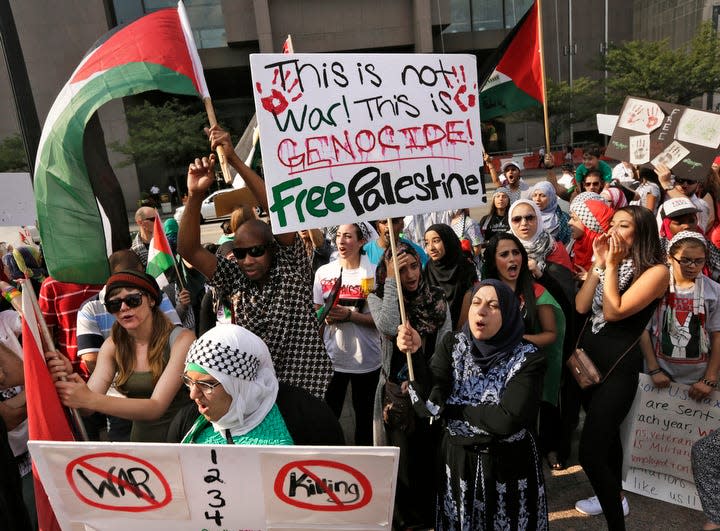Guest column: Students demand resolution of Israeli-Palestinian conflict

For three generations, Israelis and Palestinians have suffered in their struggle for peace. As last May’s deadly conflict in Gaza made clear, inaction leads to further deaths, continued abuses of the Palestinian people and a waning sense that a solution is possible in both nations. It’s time for the U.S. to take a much bolder lead in the search for peace. Our generation is demanding a solution - we must not want to pass this torch to a fourth.
As a Floridian, you likely have friends, family or neighbors directly affected by the ongoing conflict. Our UNF Political Science class includes both a first-generation Palestinian and an Israeli, whose families have suffered personally from the conflict. Florida contains the country’s third-largest Jewish population of more than 600,000, as well as the sixth largest and fastest-growing Arab population, including ethnic Palestinians, at more than 130,000.
Our tax dollars provide billions to support Israel’s defense. Floridians benefit from the roughly $300 million in annual trade between Israel and Florida. So, what happens in this conflict matters to Floridians.
We studied this conflict in our class and came up with recommendations in five broad areas to stem the current violence, rebuild Gaza, strengthen accountability and alter key elements of the current stagnated policies in the region.
The Biden administration must immediately address the humanitarian crisis in Gaza to meet the urgent water, housing and sanitation needs of the Palestinian people. The administration must press Congress to supply an additional $504 million dollars to United Nations’ programs to address the crisis and compensate for previous aid suspensions. Furthermore, the US should encourage Egypt to increase its involvement in strengthening the ceasefire between Hamas and the Israeli government and easing Israel’s blockade of the area.
The U.S. should fill gaps in Israel’s security by providing Israel with smarter drone surveillance technology to track and identify military threats on its border, as well as to fortify its Iron Dome ballistic missile defense system. The administration should also expand the Abraham Accords to include more Arab nations willing to make formal peace with Israel, in exchange for Israel further halting settlement activity in Palestinian territory. Such pacts also help counter the growing threat from Iran.
Next, the Biden administration should help jump start the building of Palestinian infrastructure that has been devastated by decades of conflict. Support from the U.S. should include increased funding for the Joint Water Committee, to help ensure equitable distribution of scarce water resources and the funding of commercial aquaponics farms. To help increase its Palestinian ties, the U.S. should establish an American University in East Jerusalem and UNF should initiate an exchange program with Birzeit University in the West Bank.
These initiatives provide Palestinians with long-term support critical in stabilizing the region, while also reconstituting U.S.-Palestinian relations.
The May 2021 conflict involved the Iranian-backed terrorist group Hamas in power in Gaza firing 4,360 rockets towards Israel that left 12 people dead and 75,000 people displaced. Israel’s response led to the death of 254 people, most of whom were civilians.
To minimize such risks to civilians, the U.S. must push both sides to develop a civilian code of conduct to minimize risks to civilians.
Human rights groups accuse Israel of mistreating Palestinian prisoners, including children. Therefore, the U.S. should call for an immediate release of all minors and an independent body should review Israel’s treatment of prisoners and arbitrary sentencing.
To address deep-seated challenges to the peace process, the U.S. must seek to minimize key obstacles, including Israel’s settlements, the Palestinian prisoner payment system -- which is accused of rewarding those who commit violence against Israel -- and Israel’s restrictions on freedom of movement and construction.
Such mutual concessions can help establish a foundation for progress, rather than decades-long failed policy of jumping into negotiating a final status solution.
Finally, the U.S. should expand its engagement in the peace process to include more Arab nations. The moribund Middle East Quartet (Russia, the U.S., the UN and the EU) should be expanded to include Egypt, which could help facilitate engagement with other Arab nations that have recognized Israel and seek to expand that list.
Over time, these approaches could provide both parties with enhanced faith in peace, increased bonds and resuscitate our generation's hope in achieving a lasting solution. While our generation did not start this fire burning among the Israeli and Palestinian people, we are determined to extinguish it.
Join us in this challenge and encourage your representatives in Washington to insist on these critical steps for peace.
The UNF class presented its policy recommendations in virtual meetings from Nov. 15-17 with officials of the Departments of Defense and State, the National Security Council, retired CIA officers, staff of Senator Rick Scott, officials in tthe Israeli Knesset, the Arab League and the Consulate of Israel in Miami and a former Israeli national security official, as well as former U.S. peace negotiators and experts at Human Rights Watch and the Washington Institute.
This article originally appeared on Florida Times-Union: Guest column: Students demand resolution of Israeli-Palestinian conflict

